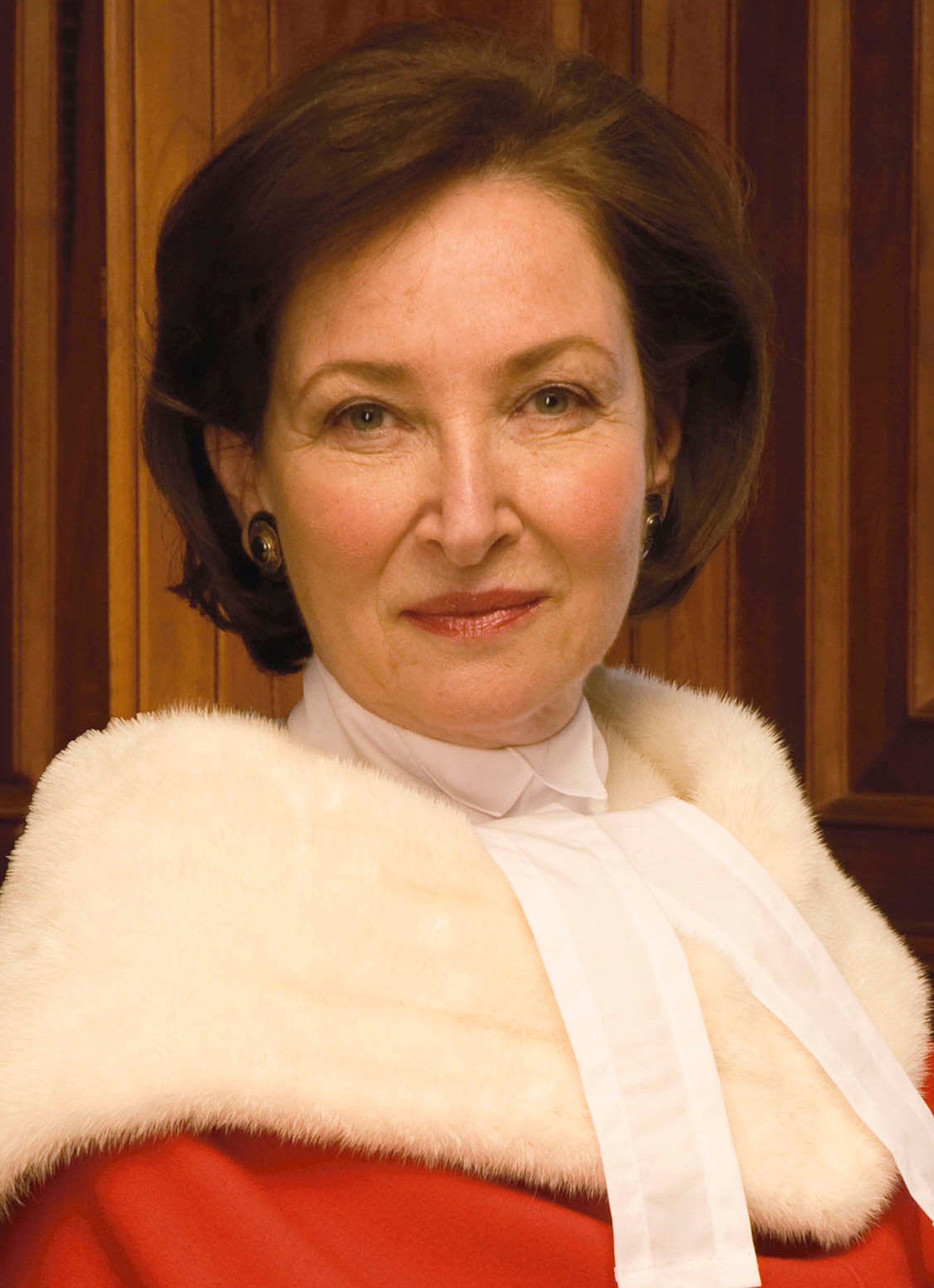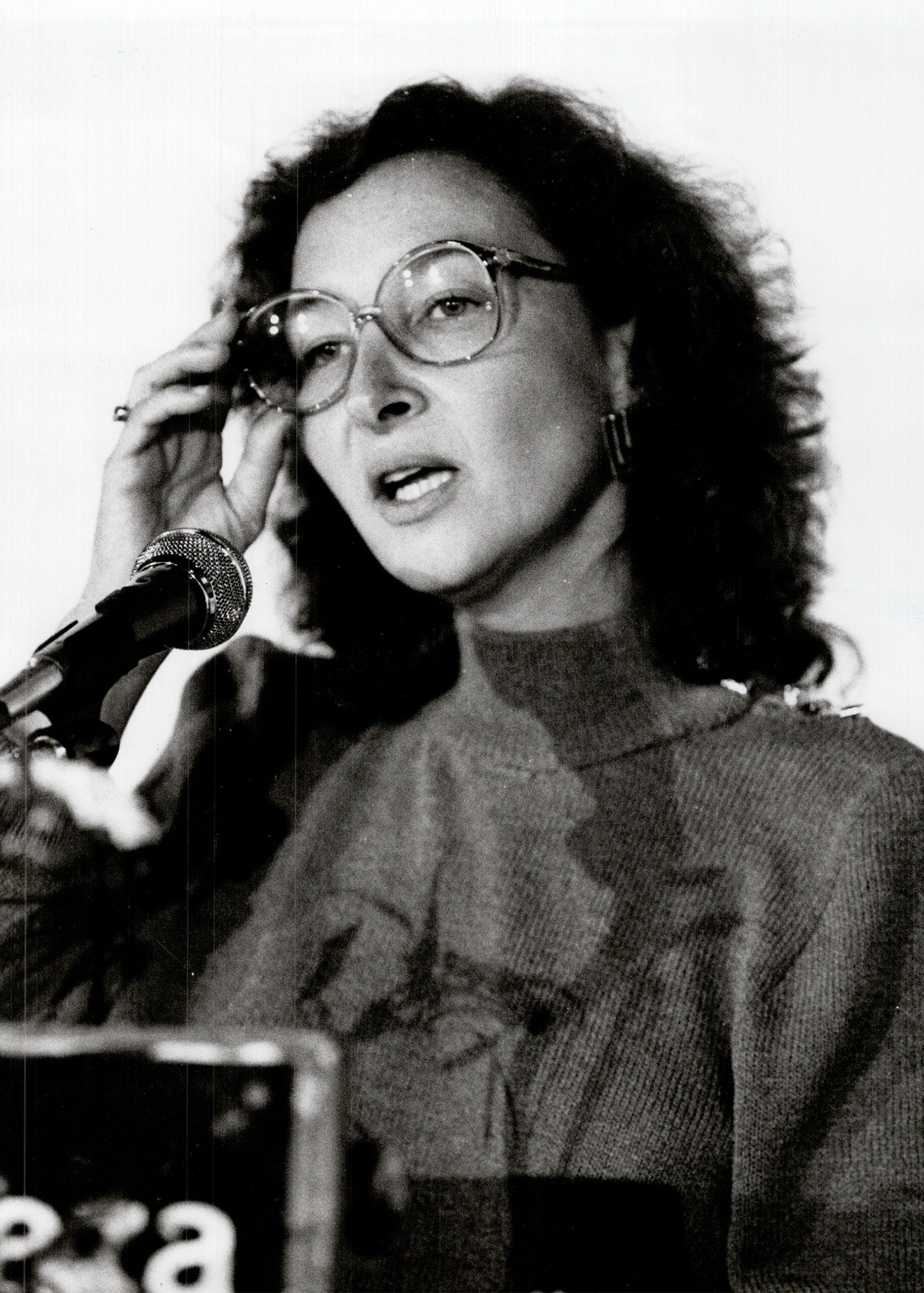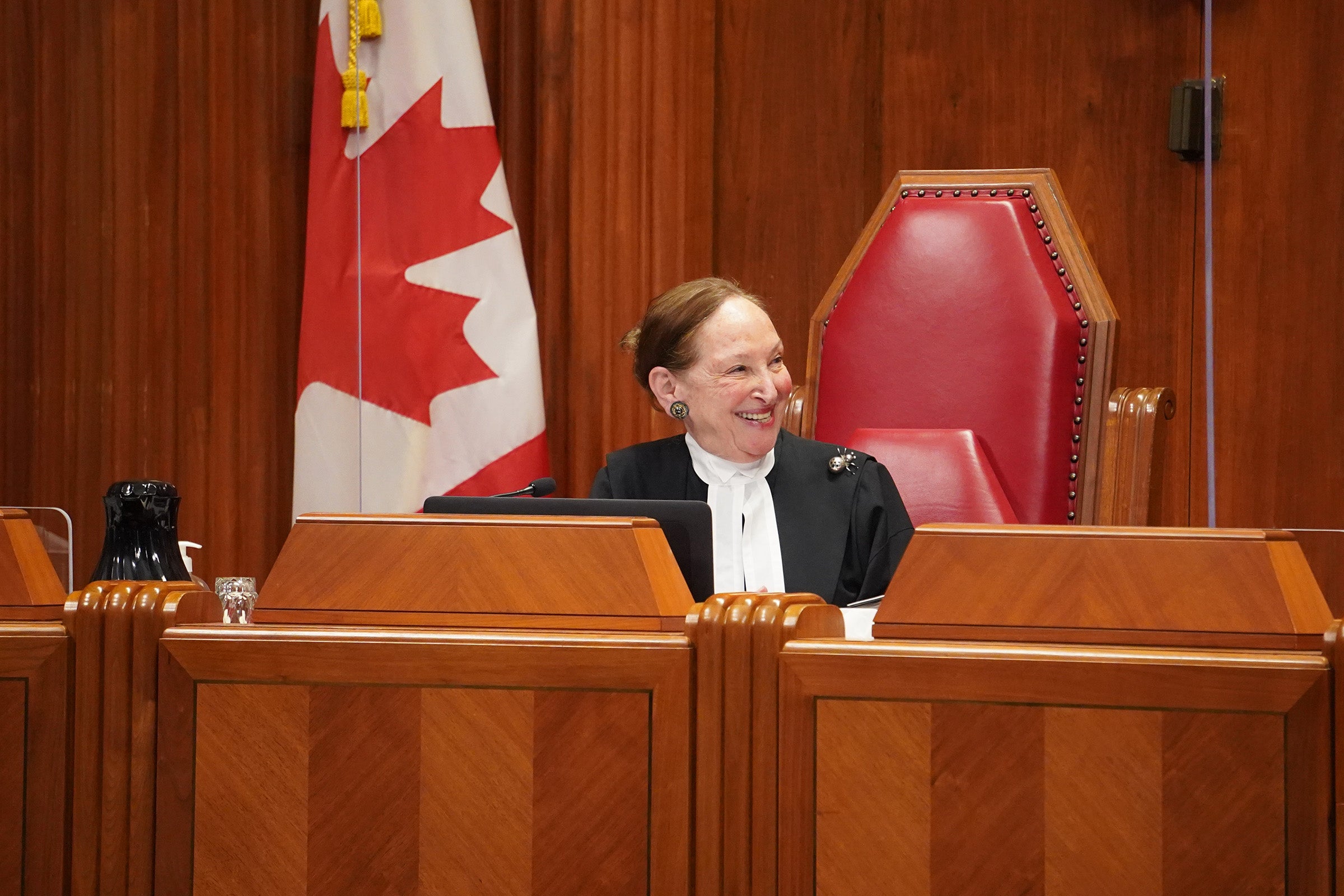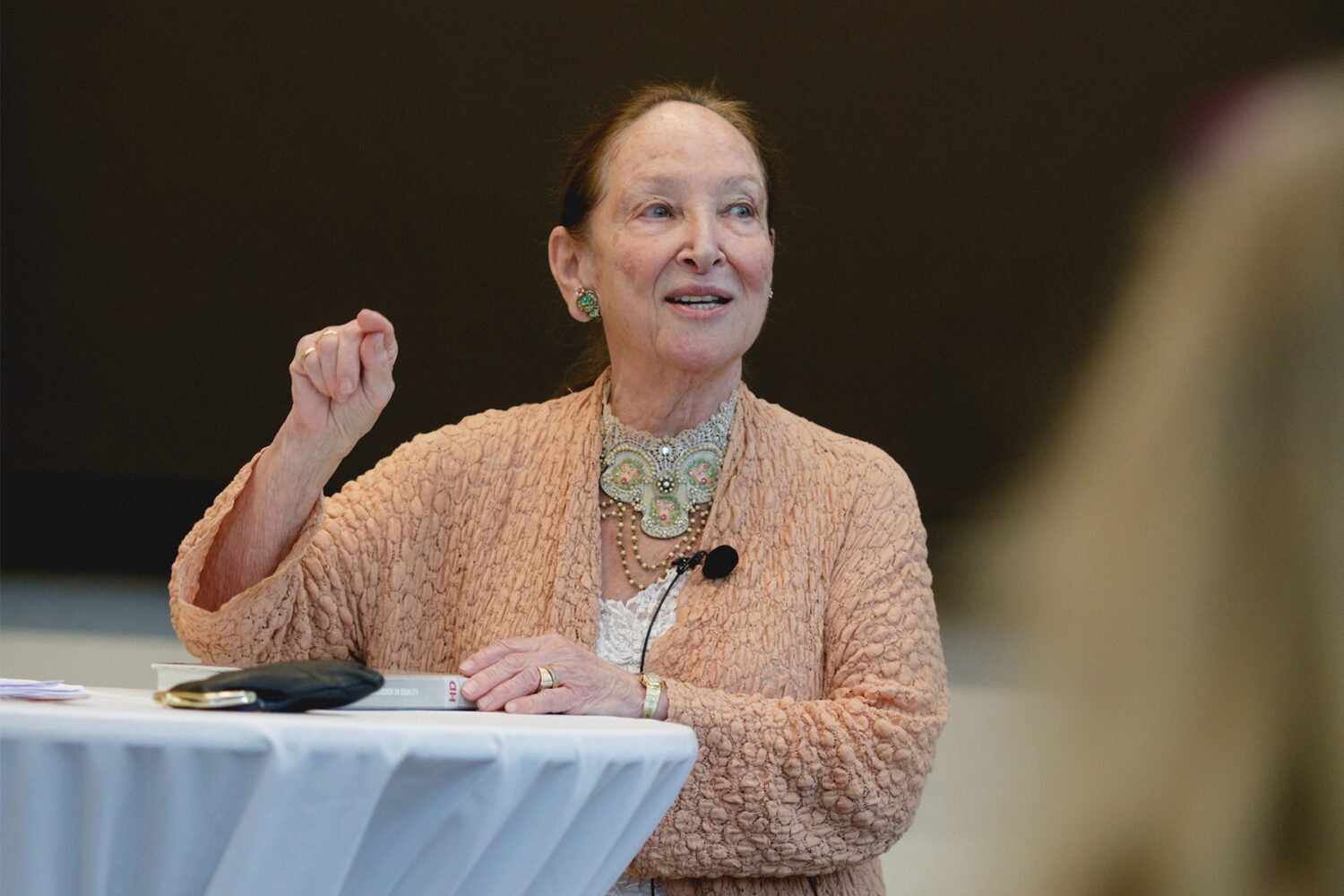Over the course of an illustrious half-century legal career, including 17 years as a justice on the Supreme Court of Canada, Rosalie Silberman Abella — the country’s longest-serving jurist — has championed human rights, constitutional and international law, labor rights and more. On Canada’s highest court, Abella helped decide some of the country’s most consequential cases, including an opinion that paved the way for the legalization of same-sex marriage in 2004. This year, Abella became the first Canadian judge to hold a chair at Harvard Law School, as its Samuel LLM ’55, SJD ’59 and Judith Pisar Visiting Professor of Law.
Abella spoke with Harvard Law Today to share more about her life and journey to the law, her role on the Supreme Court of Canada, and why she believes literature is essential to understanding people — and by extension, achieving justice.

Harvard Law Today: Why did you pursue a legal career? What made you passionate about the law?
Rosalie Abella: My family and I came to Canada from Germany in 1950. My father was a graduate of the Jagiellonian law school in Poland and had worked for the Americans in Germany after he and my mother were liberated from concentration camp. He went to the Law Society of Upper Canada in Toronto in 1950 and asked what tests he had to write to be a lawyer. The law society’s response was that he could not take any tests because he was not a citizen, and you had to be a citizen to be a lawyer. He decided to become an insurance agent instead because he had to support my mother, grandmother, younger sister and me. He never complained about the fact that he was not able to do what he had spent eight years in Europe training to do.
I was four years old at that time, and it is one of my earliest memories in Canada. I remember thinking, “I will be what you cannot be.” That is how I decided I would be a lawyer. I had absolutely no idea what it meant, but I knew how unfair it seemed that someone couldn’t be what they were qualified to be. It didn’t matter to me that I had no idea what was involved in becoming a lawyer. It was a question of rectifying the historical record.
When I was 12, or 13, I read Hugo’s “Les Miserables” and saw what injustice was. That triggered the idea in me that that is what lawyers are for — to correct injustice. Suddenly, my childhood ambition merged with the beginning of an understanding of what “justice” was, namely, the antonym of injustice. After that, I became more confident in my determination that the law was what I wanted to do.
“It is really a privilege to be a lawyer, to be in a position to have the training to try to make the small universe of an individual better.”
There were still almost no women lawyers in Ontario, and when I went to law school in 1967, there were only five women out of a class of 150. When I was called to the Bar in 1972, 15 women were called out of 520 lawyers. When we had our first son in 1973, I didn’t know any mothers who were lawyers. But it was an unstoppable fulfillment of a childhood dream, and once I actually did it, and had clients and was practicing law, it felt like a perfect fit. Sitting across the table from a client who came to me with a legal problem and wanted my help to find a solution, was the origin of my sense that it is really a privilege to be a lawyer, to be in a position to have the training to try to make the small universe of an individual better. And then eventually, as a judge, to contribute to the broader social and public interest, and to the possibility of justice for more people.
I have no regrets about doing what girls weren’t supposed to do. My only regret is that my father died a month before I finished law school and never got to see his inspiration take flight in me and our two sons, who also became lawyers.
It’s the majesty of justice, rather than of law, that I’ve come to see as the law’s purpose. The law on its own is just a series of words and rules. Unless it’s something that contributes to the possibility of justice, it’s essentially unfulfilled.

HLT: What was it like serving as a justice on the Supreme Court of Canada?
Abella: I loved everything about it. I never got over my sense of awe at being a part of one of the institutions that thinks about our national values and standards. And I never got over marveling at the quality of the lawyers who came before us, or the joy of working with my extraordinary colleagues. I learned something from each of them, and I never got tired of the collaborative process, the possibility of participating in the creation of a decision that promotes the values of justice in so many areas, and being able to think about what the law and justice mean with so many smart people.
HLT: Are there any cases that stand out?
Abella: I would say one was the very first case I sat on when I got to the Court, and which we spent a week hearing arguments about — the same-sex marriage reference. I reveled in the ability of nine people to sit around a table and figure out a way to write a judgment that protected the ability of people to choose a marital partner based on their own preference. And to be able to come up with a decision that was “by the court.” In other words, it was not authored by a single person. This was the deliberative process at its finest. I marveled that nine very different people were able to work through some really innovative legal and policy questions and come out quickly with a unanimous decision. It was my first introduction to the possibility of the Court as a collegial environment where you could take what you heard from lawyers in the courtroom and what you read outside the courtroom, mix it up with the excellent ideas of your colleagues, and come out with a new direction for the country.
I tell people that it’s like having eight spouses that you didn’t choose and who didn’t choose you. If you think about what it’s like to make family decisions with someone with whom you’re living, basic decisions like where to go for dinner or whether you’re going to go to a movie — well, imagine making every single decision with eight strangers, the most important decisions in a country. So the very institutional setup is intriguing. It’s a miracle that we have any decisions that are unanimous, let alone how often we get unanimity, because you’ve got nine independent and intelligent people who have their own thoughts about what law is or what justice means, what a constitution means, what democracy means. Unanimity was really a minor miracle every time it happened.
Yet we were able to do it on many crucial and complex social questions like assisted dying, prostitution, family law cases, constitutional cases, copyright, corporate law, or criminal law. Sometimes it was harder than other times, but my favorite part was thinking through these complex legal questions with other people.
“The law on its own is just a series of words and rules. Unless it’s something that contributes to the possibility of justice, it’s essentially unfulfilled.”
HLT: How would you compare the way the Supreme Court of Canada and the U.S. Supreme Court function?
Abella: Our appointment process is very different. Our deliberations, I gather, are different. We don’t do the serial monologues approach. We have open-ended discussion right after the case. After we’re done discussing the case, we will go in reverse order of seniority to see what the bottom line is — whether it’s “allow,” or “dismiss,” so that we can see where the majority is. It is truly deliberative.
I don’t know enough about the inner workings of the U.S. Supreme Court to fully compare them, but it is clear to me now that we certainly see our roles differently. This is not surprising because we’re very different countries. Canada has a new, post-World War II constitutional rights framework that we got in 1982, and the American Constitution is 200 years old. You are inevitably going to have differences based on very different experiences about how the country started and where the country is going.
I think one of the main differences between the two countries is the way we approach individual and group rights. The political DNA of America is individual-based. When Canada negotiated its creation in 1867, the groups at the constitutional bargaining table were the French and the English. We are comfortable with the idea that two groups who are different can come together as equals despite their differences. And so, unlike the assimilationist melting pot model that I think informs America, we have an integrationist approach, which is the basis of how we see equality — that you join the mainstream as equals based on and notwithstanding differences, and that those differences should be accommodated rather than obliterated or pretending they do not exist. That also makes us perfectly comfortable with group remedies like affirmative action.
In other words, we are comfortable with both the civil libertarian approach to rights, where the state has to avoid interfering with the individual’s ability to exercise rights, and the integrationist group remedies approach, where it sometimes takes government intervention to create the environment that is going to allow people to be able to exercise their rights. The core of our approach is that you can exercise your differences provided they don’t collide with core national values, or don’t harm others or interfere with the ability to exercise their rights. I think that’s the philosophical difference between the two countries — ours is assimilation if necessary, but not necessarily assimilation, to paraphrase one of our Prime Ministers, [William Lyon] Mackenzie King, and yours is a melting pot.
HLT: What has it been like transitioning from the court to teaching at Harvard Law?
Abella: I feel like everything I’ve ever done in my life has helped me in what I’m doing now at Harvard Law. I’ve gone from one extraordinary piece of good luck, including being on the Canadian Supreme Court, to the extraordinary piece of good luck of being able to be part of the Harvard Law School. I’ve been reading books and articles by Harvard Law faculty for years, and citing them seamlessly my entire judicial career. When you’re a judge, you get to be a kind of an expert in discrete areas, but a professor digs deep. So I’m strongly of the view that we judges can’t do our job without taking into consideration the scholarship of people who spend their lives digging into their respective areas. We don’t have to agree with everything we read, but it helps your own thinking to hear from others who know so much more than you do. The polymaths at this law school are amazing to me. I feel like I’m being given a chance to learn, and I’m grateful to Harvard Law School and especially to Dean Manning for giving me the chance to do that.
The students have also been great, and the staff of the Law School have been very warm and welcoming. It has made the transition easy and joyful. I pinch myself because I can’t believe that I’m lucky enough to be here with these faculty, staff, and students.

HLT: You are currently teaching a course about the role of the judiciary in a democracy. What does that mean to you? Has that role changed?
Abella: I’m not sure that the role has changed, but I certainly think the perception of the role has. I don’t know how much time the public has spent thinking about the role of a supreme court in a judiciary generally — or whether there is even a consensus about what democracy means.
I thought about the role of the judiciary when I finished law school, because I found our judiciary not really reflecting the world that I had grown up in. Judges tended to come from fairly homogenous backgrounds, a life that was organized around settled expectations. I hadn’t. I had come from a life that was all about opportunities, not entitlements.
I remember in law school looking very wistfully at the role of the judiciary of the United States. The Warren Court was so energetic in protecting people’s rights, and I thought that is exactly what a court should be doing. If courts aren’t protecting the rights of minorities, then who? Our Canadian judges were constrained in constitutional law by the fact that our constitution at the time was a document — the BNA Act — that set out spheres of authority. Section 91 set out what the federal government was entitled to do. Section 92 set out what the provinces at the time were entitled to do. And so it was a division of powers constitution, and there wasn’t a whole lot of room for visionary interpretation. It wasn’t until we got the Charter of Rights and Freedoms in Canada in 1982 that we really started in depth the conversation about the role of the judiciary in a democracy.
We had always assumed certain democratic principles: that majorities elect governments, and that governments are responsive to those majorities — that’s how they get elected and reelected. But we also came to understand that democracy is not just about elections, and it is not just about majorities. It’s about the rights of all people to be free from majoritarian views where they conflict with the ability of others to exercise rights.
HLT: What institutions act as a check and balance in Canadian democracy?
Abella: One body is the media, which plays an important role in holding the mirror up to the public. But also courts — unelected courts — unelected specifically to give them the tools to protect interests that are not majoritarian, and to protect the vulnerable who cannot expect that they are going to get a responsive audience from people elected to represent the concerns of that majority. Rights are guaranteed. The government can justify an infringement or limitation on the rights if it can demonstrate that on the whole, in a free and democratic society, the benefits of the limitation outweigh the harm caused to the claimant based on a proportionality and balancing assessment. If it can’t, the law falls. That’s the judicial role in Canada in constitutional cases.
So those are the conversations that we started having in Canada after we got our Charter of Rights and Freedoms and, by and large, it was a conversation that the public really reveled in, because we had never really had the chance to think about the judicial role in that way. And so we became a constitutional democracy, and the constitution was supreme. We had a “notwithstanding clause,” where governments could decide that they wanted to pass laws that were exempt from the scrutiny of the Charter of Rights and Freedoms, but in the past, governments didn’t use it much, and left it to the courts to decide the tough questions, like abortion or same-sex marriage or assisted dying, that they were reluctant to engage in because it would have created enormous controversy and electoral consequences for them. Judges understood that controversy was inevitably part of our job.
HLT: What is it like teaching this course amid all the controversy surrounding the U.S. Supreme Court?
Abella: Teaching this course in the United States now, with the whirlpool of anxiety that swirls around when the Supreme Court makes a decision, is, for me as an outsider, a fascinating exercise. Everything is contested here — what a democracy means, or the role of the Court, or the role of precedent. To a Canadian, the idea that a Court can remove settled rights, can cavalierly disrespect precedent, and that has an anemic view of what the Court’s protective function is — that is all very strange to us.
We of course change precedents as well. Every country that has a supreme court will be confronted from time to time with the need to do so, but what I have never before seen in a western democracy is that precedent is changed in a way that restricts rights rather than expands them. In Canada, for instance, the trajectory has always been that if you’re changing a precedent, it’s usually because there’s a fuller and wider social understanding of what the content of the right is. It’s an increasingly inclusive approach. The notion of originalism to us is bizarre. What does that even mean, and what does it matter anyway what the original meaning of a right was 200 years ago? Constitutions are not created to protect the framers, they’re designed to protect the public, to protect their rights in a vibrant and generous democracy.
That isn’t to say we don’t take history into account, because we do, but society is not static. There are clear values that Canada accepted in the early Charter jurisprudence, values that include dignity, human rights, and protection for minorities. That’s who we are, and that’s how we have to decide our cases: in accordance with those values. It’s an ever-expanding trajectory, never a constricting one.
“I think literature, novels, plays, are where you learn about life. And if you don’t know about life, then you can’t judge it.”
HLT: You are also teaching a course next semester about law and literature. How do you think law students benefit from reading and analyzing literature?
Abella: Books are where I learned what people were like. I was lucky. I grew up in a very happy home, with two loving parents, a wonderful younger sister, and a doting grandmother. I wanted to go to law school and I got into law school. Getting a job after I graduated wasn’t the easiest thing in the world, but I did eventually get a job. So, I can’t say that my life really represents real life for most people. But where I learned about life, about others’ lives, was from reading books. Even though I have zero taste when it comes to movies and will see any kind, I find I’m more of a snob about books and only like good literature. I think the best description I found about the role of culture and arts, other than in Matthew Arnold, was in the introduction to Ralph Ellison’s book, “Invisible Man.” He talked about novels representing the “human universals.” I thought that was such a wonderful phrase. He also talked about how they could be “rafts of hope.”
I went through the Russian and French 19th century novelists before I was 15 years old. I didn’t go through a lot of British writing when I was a teenager, but I came to that later. As a teenager, I started reading 20th century American literature and I was hooked.
When I was a family court judge, I was confronted with a constant stream of people who went from what Walter Lippmann called “the day’s drudgery to the evening’s despair.” Had I not read Joyce Carol Oates’s book “Them” or those other great European novels, I couldn’t have appreciated the disadvantage they were coming from on a daily and inescapable basis. If you see law as having a relationship with justice, and see justice as the aspirational application of law to life, then I think literature, novels, plays, are where you learn about life. And if you don’t know about life, then you can’t judge it.
